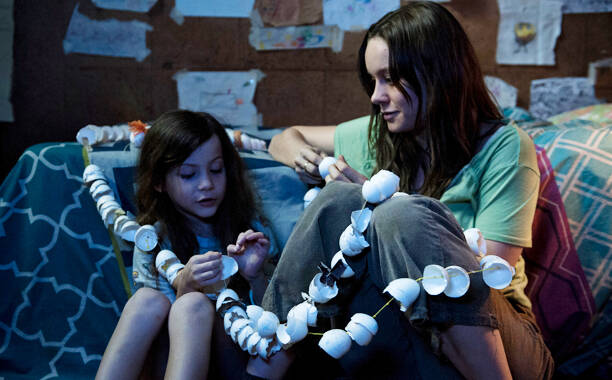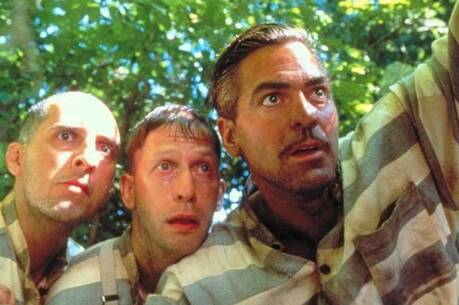We’ve all seen horror movies. Most of us have seen one or more of the recent spate of dystopian movies depicting a world gone horribly wrong. And many of us have seen films about women being physically abused by sociopathic husbands or other men. But “Room” offers a combination of all three of these in the story of a woman who has been kidnapped and imprisoned in a 11-by-11 foot garden shed by a sadist who is known only as “Old Nick” (the reference to the devil is no coincidence).
The young actress Brie Larson plays Joy Newsome, who has lived in The Room for seven years, in the course of which she bore a son, named Jack, who, as the story begins, has just turned five. This is the only world the child has known and his “Ma” spends her days with him—the only person besides Old Nick with whom she has any contact—playing with him, teaching him and otherwise making a life for each other. Old Nick buys food for them and pays for the electric bill; he has even provided them with an old television set with poor reception that offers them their only information about the outside world. In one of the film’s most poignant scenes, Joy tries to describe the real world to Jack, telling him about trees and houses and other people, but Jack cannot fathom such an environment and denies her stories. He seems to think that everything beyond The Room, even their food, comes through the television set.
Besides the obvious claustrophobia of the situation, there is an eerie fear of the violence of which Old Nick is quite capable of providing. He regularly visits the room to demand sex from Joy and then berates her for her ingratitude to him and threatens her if she ever tries to escape. The camera concentrates on Nick’s hands and feet, seldom showing his face, since we see much of his presence from Jack’s point of view.
With nothing to do, Joy tends to sleep a lot while Jack is quite creative in finding ways to amuse himself. He even imagines that he has a dog, which he knows about only from television. His only actual contact with nature is the piece of sky and the occasional moon that he can see through a small skylight in the roof of the shed.
Halfway through the film (spoiler alert!) in a quite desperate act, Joy and Jack escape. Jack’s reaction to his first views of other people, the natural environment and everything else around him is quite moving. After such an overwhelmingly deprived childhood, Jack has somehow managed to avoid severe mental illness and is able slowly to adjust to a “normal” life, even learning to play with friends. Joy has much more difficulty returning to the outside world. Her father (William H. Macy), who has been separated from his wife (Joan Allen), possibly because of the pain of their daughter’s disappearance, cannot really deal with Joy’s return, displaying inappropriate anger and the odd inability to look at his newly discovered grandson in the eye.
The 25-year old Larson has already enjoyed an extensive acting career ever since her first small-screen appearance on “The Tonight Show with Jay Leno” at the age of four and subsequent roles as a child and a teenager in both film and television, mostly in comedies. This is no comedy, however, and Larson delivers a powerfully understated performance as a woman determined to survive in an extraordinarily hopeless situation. Often shown, of course, in extreme close-up, Larsen’s blank face conveys her emotional control while her eyes express her chronic sadness and her profound love and care for her child. Jacob Tremblay is excellent as Jack in a performance that is straightforward with no obvious attempt at sentimentality or outreach to the audience’s pity. Jack seems to make the best of the only world he knows and appears almost content in its bizarre confines.
The film is based on the 2010 novel by Emma Donoghue, a Dublin-born writer who now resides in London, Ontario, who also wrote the screenplay. It is directed by another Irishman, Lenny Abrahamson, who has been quite successful in directing television commercials and award-winning films since 2004. “Room” won the People’s Choice Award at the 2015 Toronto International Film Festival and is bound to be a breakout moment for both Donoghue and Abrahamson.
Some critics have faulted the second half of the film for employing the overused plot of a family attempting to survive a major disaster, in which their attempts to confront or heal each other usually result in some painful re-examination of the family’s past. Such is the case with Joy and her parents. Our familiarity with such a pattern is certainly understandable since such conflicts have been part and parcel of American theater and film ever since the social realist dramas of Clifford Odets in the 1930s and the poetic naturalism of Arthur Miller, Tennessee Williams, William Inge and many others.
In Williams 1945 classic, “The Glass Menagerie,” the mother Amanda Wingfield, pleads with her restless son not to leave their dreary apartment that he describes as a “2 by 4 situation,” with her observation that “in these trying times, all that we have to cling to is—each other.” What gives “Room” its originality and power is its vision of a mother and a child literally clinging so tightly to each other in an “11 by 11” situation beyond our imagining. While horror films and recent dystopian tales have relied on imaginary “what if’s,” this film relies on real-life stories of survival in brutal cages drawn from news accounts. This makes “Room” much closer to a documentary than a fantasy. Finally, at the center of all the horror and suspense, it is a tale of a mother’s love beyond all telling.








